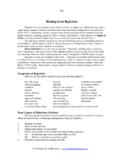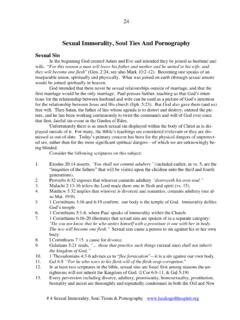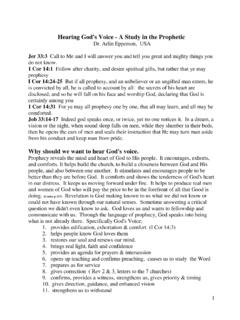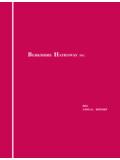Transcription of Healing from the Spirit of Poverty
1 87. Healing from the Spirit of Poverty Most of the world lives in Poverty . In many countries, it's a way of life which has embedded itself within the culture, and it has remained that way for as many generations as anyone can remember. Poverty permeates the mindsets and the attitudes of the people. Unfortunately, they know no other way. Living in Poverty is accepted and expected; it becomes a generational trend within a Poverty culture. Regrettably, most Christians do not realize that Jesus' death on the cross provided not only for the forgiveness of our sins and for Healing from our sicknesses, but additionally for Healing from Poverty . Take into consideration the following scriptures: For ye know the grace of our Lord Jesus Christ, that, though He was rich, for your sakes he became poor, that ye through His Poverty might be rich 2.
2 Cor. 8:9, and, Worthy is the Lamb that was slain to [in order that we might] receive power, and riches . and blessing Rev. 5:12*. Jesus has paid the price that we might be rich.. One of the biggest limitations to receiving God's abundance in our lives is the lack of understanding and acknowledgment that blessings of prosperity are one of the reasons Jesus died for us on the cross. We have no problem believing He died for our sins. And many accept as well that He died for our Healing (of body, mind and Spirit ). Why, then, do we have a problem believing He died to free us from a state of Poverty ? Again, realize that Jesus died for (1) our sins (salvation), (2) our sicknesses ( Healing of body, mind and Spirit ), and (3) our finances (our fiscal needs). Likewise, Jesus' death on the cross atoned for the curse of Poverty .
3 Take notice below of how this fact is revealed in Scripture: He hadn't eaten in over 24 hours (Hunger). He was thirsty ( I thirst ) (Thirst). He had nothing and was stripped of his cloak (Nakedness). He had no burial place (In need). Unfortunately most Christians do not realize that, as a child of the King and an heir to His promises, we are entitled to the financial blessings afforded us because of the cross. The first step in Healing from the curse or Spirit of Poverty is to understand and accept that just as there are two kingdoms at work in the struggle for our souls (the Kingdom of Darkness and the Kingdom of Light), the same two kingdoms are likewise at work in the area of our finances. These opposing kingdoms include the earthly kingdom of Mammon (or the pull of the culture characterized by need, lack, deprivation, hunger, insufficiency, fear and Poverty ) in contrast to God's heavenly economy of Abundance the mind and heart of God (characterized by abundance, plenty, peace, sufficiency and trust).
4 Mammon Economy Mammon (or the world's) economy is based upon credit, debt, want, prestige, desire for prosperity, financial stress, worry, fear, greed and covetousness, which are forms of idolatry. God hates idolatry in any and all of its forms. Idolatry is the act of putting someone or something in a higher place of value and respect than where we place God. Note that the first three commandments *. Unless otherwise noted, Biblical references are taken from the King James Version. #14 Healing from Poverty 88. (see Ex. 20) are direct cautions against idolatry. Eph. 5:5 explicitly informs us, For this ye know, that no whoremonger, nor unclean person, nor covetous man, who is an idolater, hath any inheritance in the kingdom of Christ and of God.. Money is the chief rival god, as the use of money for greed, covetousness and/or hoarding is contrary to God's design of sharing, giving and generosity.
5 Greed refers to the desire for extravagant (unnecessary and selfish) wealth and covetousness (in this Biblical context) refers to having an excessive and unregulated (undisciplined) envy with regard to things that do not belong to us. God takes greed and covetousness very seriously. Mamona is an Aramaic term for wealth. The NIV of the Bible capitalizes Money or Mammon because it is a proper name. Mammon is a spiritual person in the demonic world. Mammon produces the Spirit of Poverty . Covetousness and greed are characteristics in allegiance to the false god named Mammon. In Scripture, when Jesus mentioned Mammon, it was in the context of not being able to serve two masters. Serving any supernatural master (like Mammon) in the demonic world is considered hard-core idolatry. Satan wants us to be in bondage to and to serve the Spirit of Poverty .
6 Recall the rich young ruler (in Mat. 19:16-22) who came to Jesus and asked what he needed to do in order to inherit eternal life. When Jesus answered him, telling him to sell all that he had and to give to the poor , Scripture says, he went away sorrowful: for he had great possessions. This passage points out the rich young ruler's lack . his attachment to wealth (Mammon) being greater than his attachment to God. Consider also the following attributes of Poverty . Poverty is a tormentor. Poverty creates a climate of hopelessness where seeds of suicide grow. Poverty strips a man or a woman of their self-confidence and sense of worth. Poverty blurs and diminishes visions and dreams. Poverty is where the seeds of anger and cynicism grow. Poverty is slavery (and financial captivity is unnatural). The Spirit of Poverty will make you critical of those who are trying to set you free.
7 Poverty will make you question the truth about God, who is your true Source and Provid- er. Poverty births fear, and fear makes you want to hoard which cuts off supply. Poverty is not merely a financial circumstance of your life, it is a spiritual condition of your heart and soul. Poverty is a Spirit to be cast out. The Lord is my deliverer Ps. 18:2. Poverty is an enemy to be destroyed. Poverty is a curse (see Deut. 28:15, and chapter 30) and was a result of Adam's sin. However, Christ's death on the cross met the demands of justice for the cancellation of the curse of Poverty (as exemplified in the Scriptural passage which notes mercy triumphs over justice ). God's Heavenly Economy of Abundance Unfamiliar to most, God's economy has unlimited resources. Within God's economy, there is no want or lack. God's economy is characterized by sufficiency, plenty, abundance and feelings of peace, contentment and trust.
8 Lovingly, God's economy makes the problems of the economy of Mammon disap- # 14 Healing from Poverty 89. pear. Recognize that God does His part when we do our part. Consider the following characteristics of God's heavenly economy: 1. God has infinite resources and as His heirs, all these resources are available to us. For example: Ex. 16 in the wilderness, the Israelites were fed manna for 40 years 1 Ki. 17:8-16 Elijah and the widow; her oil and meal did not waste, until . 2 Ki. 4:1-7 Elisha's counsel to the widow; one pot of oil filled many the oil was sold and the widow's debt was paid 1 Chr. 29:3-28 David, although born a poor peasant, gave untold wealth to build the temple, recognizing and acknowledging all things come of thee (vs. 14). Mat. 14:15-21 Jesus fed 5000 men with 5 loaves and 2 fishes Mat.
9 15:32-38 Jesus fed 4000 men with 7 loaves and a few little fishes, with 7 full baskets left over Mat. 17:24-27 Peter and the coin in the fish Luke 5:1-11 Simon Peter casts his net on the other side, and the net almost broke for the abundance of the weight of fish he caught 2. God multiplies rather than adds In the Mammon economy, 5-10% interest is considered good. Compare this interest with the manifold returns God promises us: Gen. 26:12 Isaac was blessed 100-fold Gen. 30:27-30 Laban acknowledges the increase of his cattle was because of Jacob's favor with the Lord Mat. 13:12 and Mark 4:8 an increase of 30, 60, or 100-fold; For whosoever hath, to him shall be given, and he shall have more abundance .. Other Scriptures which promise manifold increases: Mat. 19:29 and Mark 10:28-30. Our part in sharing in God's heavenly economy is, FIRST, to make a choice, a commitment and a promise to follow God's plan rather than man's plan that is, to pursue financial freedom and blessings rather than financial foolishness, as in the admonition in Deut.
10 11:26, Behold, I set before you this day a blessing and a curse . Also, I have set before you life and death, blessing and cursing: therefore, choose life, that both thou and thy seed may live Deut. 30:19 and vs. 15 (also Jos. 24:15). And, as Mat. 6:24 warns, No man can serve two masters: for either he will hate the one, and love the other; or else he will hold to the one, and despise the other we must choose. We cannot simultaneously operate in the Mammon economy and in God's abundant economy. SECONDLY, we must meet the conditions He has stated in His Scriptures for receiving the blessings He has promised. I. What the Scriptures Say about Money 1. The Scriptures say more about money, possessions and stewardship than about any other subject. Consider the following: 16 of the 38 parables Jesus told were about money or possessions.














